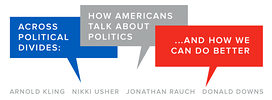A post can be factually correct but still serve no purpose other than to stir up anger. That is one reason I don’t think that curating content for accuracy is going to be of any real help.
Rather than focus on fake news, I would emphasize other characteristics of social media, including that it is “optimized to instantly propagate impulsively” as Jonathan puts it. It is not obvious how to fix that. I have argued for starting new social media services with a business model that does not involve advertising, in the hope that this might produce better behavior. But lately I am more pessimistic about whether that would work.

